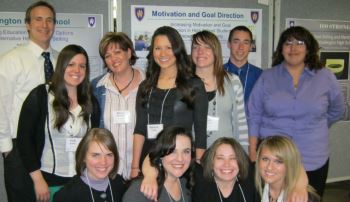Psychology Students Impact Lives of At-Risk Kids
Practicum Becomes Labor of Love for WSU Undergraduates
 Jordan Giles’ first attempt to tutor a struggling student at Ogden’s George Washington High School (GWHS) was unsuccessful, so much so that the girl he was tutoring quit their sessions. “My efforts to help her with math only frustrated her more,” said the Weber State University psychology major. Giles, however, was not willing to give up, and the girl, behind in credits and facing the possibility of not graduating, relented after several weeks of convincing on Giles’ part. They worked together daily until she began to grasp the concepts that had once puzzled her.
Jordan Giles’ first attempt to tutor a struggling student at Ogden’s George Washington High School (GWHS) was unsuccessful, so much so that the girl he was tutoring quit their sessions. “My efforts to help her with math only frustrated her more,” said the Weber State University psychology major. Giles, however, was not willing to give up, and the girl, behind in credits and facing the possibility of not graduating, relented after several weeks of convincing on Giles’ part. They worked together daily until she began to grasp the concepts that had once puzzled her.
In a school known for second chances — George Washington is an alternative school in the Ogden School District — Giles and the student he was helping were both grateful for theirs. With his help, she caught up on her studies and graduated — three weeks early.
“By giving these high school students opportunities to get back on track academically, they can then consider college when they would not have been able to otherwise,” Giles said. “Their success not only benefits them but also benefits the community. This has been one of the most rewarding experiences of my college career.”
Giles’ tutoring was part of a practicum for 45 psychology students. Designed by psychology instructors Maria Parrilla de Kokal and Melinda Russell-Stamp, the practicum required students to volunteer at least eight hours a week at the high school.
The Weber State students focused on helping the GWHS students with their studies. They then encouraged them to consider college, organized visits to WSU and local applied technology colleges, and introduced them to financial aid processes and other services.
“Many of the students at George Washington had little hope of attending college,” said practicum student Belia Alvarado. “Poor academics, troubled family life and cultural differences caused them setbacks. It was nice to familiarize them with college and let them know it was a possibility.”
The psychology students also taught job preparation skills, including how to complete job applications, manage stress and prepare for job interviews.
The practicum was a success, and Weber State has presented several times on the effectiveness of the program, both locally at the Service Symposium and for the Ogden School Board, and nationally at APA-Division 45 of the National Association of School Psychologists.
"An unexpected outcome of the practicum was how engaged the WSU students became during this experience," said Russell-Stamp. "Thirty-eight percent of the students continued to be involved at GWHS even after their practicum semester ended. The students were so impacted by the relationships they formed with faculty and students at GWHS that they held fundraisers to earn money for books and Weber State registration fee scholarships for GWHS students."
The experience was especially important to Alvarado, who, like many of the students at George Washington, had a difficult past.
“They reminded me of me,” Alvarado said. “I was always in trouble and almost didn’t graduate high school. I had someone who made a difference in my life, someone who wanted to help me succeed, and I am glad I had the opportunity to be that someone for these kids. Many of the students we met were struggling with something difficult and had pretty much given up. By believing in them, we helped them believe in themselves.”